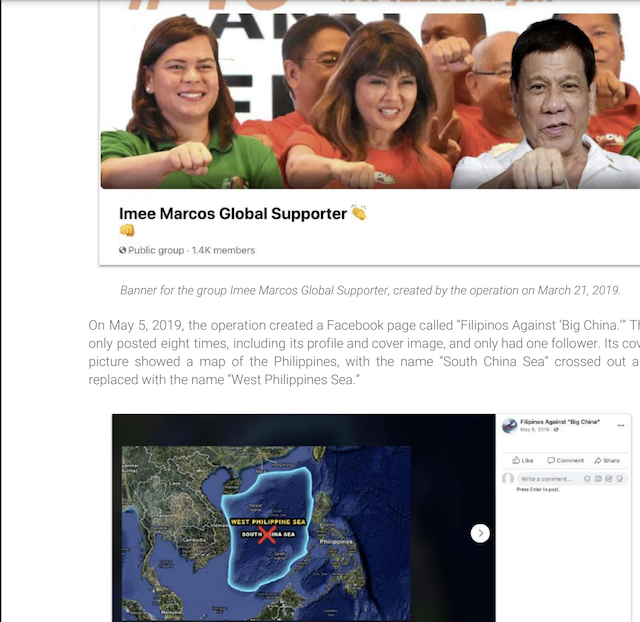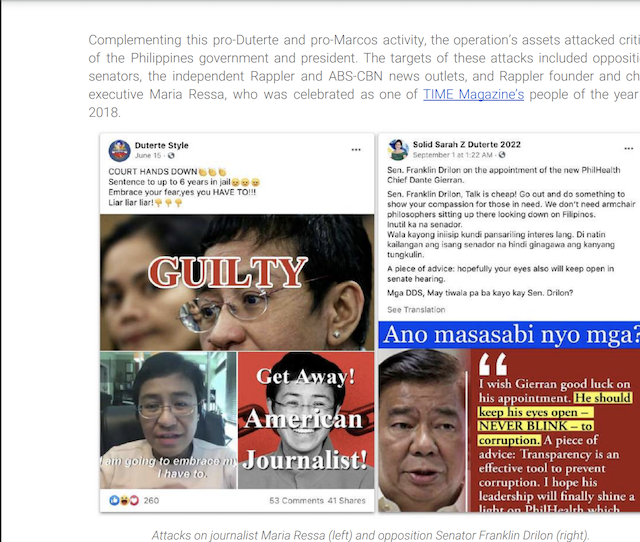I can live without Facebook. I went through LiveJournal, Friendster, MySpace and Multiply. Facebook will be irrelevant one day. Even Twitter. And yes, some of us might go back to having individual websites or blogs with our unique domain names.
President Rodrigo Duterte threatened to ban Facebook as some “advocacy” accounts were taken down because of “coordinated inauthentic behavior” (CIB). In line with Facebook’s commitment to authenticity, they “don’t allow people to misrepresent themselves on Facebook, use fake accounts, artificially boost the popularity of content, or engage in behaviors designed to enable other violations under our community standards.”
Other than the Philippines, some accounts were removed in India, Egypt, Russia, Iran, Myanmar and Vietnam in February and March because of CIB.
I believe Facebook was right in taking down 31 pages and 77 Facebook and Instagram accounts linked to individuals affiliated with the Philippine military for engaging in CIB. According to Palace spokesman Harry Roque Jr., supporters of President Duterte would find other platforms to “spread information.” This is not the first time that Duterte supporters threatened to leave Facebook. Two years ago, Duterte supporters announced they would move to VKontakte, a social media service in Russia combining the functionalities of Facebook, Spotify and YouTube. They stayed for a few weeks. It must be boring if your audience is an echo chamber.
My grapevine tells me that Duterte supporters are encouraged to migrate to Bigkis Timeline. I have not tried the app, but my first impression is that it looks similar to Facebook. According to Bigkis.com, they claim to be “an all-Filipino social media platform for the sociable Filipinos.” Duterte needs to understand that Facebook’s CIB policy is intended to create a space where people could trust the people and communities they interact with.

The recent CIB was first spotted in Rappler reports in May and August this year, using social media monitoring tool CrowdTangle and Sharktank, a database that tracks publicly posted content in Facebook groups and pages. Their report reveals “police pages and accounts habitually share content from dubious, anonymously managed pages known for perpetuating lies and for red-tagging individuals and groups.” Prior to the removal of accounts, The Atlantic Council’s Digital Forensic Lab or DFRLab (DFRLab) had access to a subset of the assets — 23 pages, 42 Facebook user accounts and 28 Instagram accounts.
According to DFRLab, these assets engaged in the “red-tagging” of Duterte’s critics, the practice of branding opponents as communists and terrorists, and supported the controversial anti-terrorism bill. Though Facebook’s CIB policy focuses on the behavior of assets, its policy against violence and incitement looked into the potential for real-world violence and other offline harms. While this network was removed for CIB, “the content of this operation contributed to the assessment of possible harm,” the DFRLab added.
Let’s look at two advocacy examples reported by the DFRLab:
– Enlightened Youth, ITO KAMI, Pinoy Ako and, to a lesser extent, Masang Pinoy posted the same photos accompanied with identical text within under a minute from each other on a systematic basis, a pattern that betrays a strong degree of technical coordination.
– One of the Facebook administrators of Hands Off Our Children, a group of mothers fighting against terrorist recruitment, is Alexandre Cabales, chief of the Army Social Media Center.

Is that authentic behavior? If you want to use Facebook as your platform of advocacy, reach out to like-minded individuals that could collaborate with you. Create campaigns with clear goals. That is authentic behavior. Meanwhile, the House of Representatives will initiate proceedings to determine whether the reported actions of Facebook were “detrimental” to the freedom of expression. “Is there life after Facebook? I don’t know,” Duterte asks.
While Facebook has yet to create an oversight board, 25 industry experts formed their own a group to analyze and critique Facebook’s content moderation decisions, policies and other platform issues in the run-up to the US presidential election and beyond.
Using Facebook is a choice. We existed before Facebook came into our lives. We could live without it. And Facebook is not the internet. The world of social media goes beyond any single platform.
Read more on Facebook’s policy rationale on Coordinated Inauthentic Behavior https://www.facebook.com/communitystandards/inauthentic_behavior
First published in Sunday Business & IT on October 4, 2020.